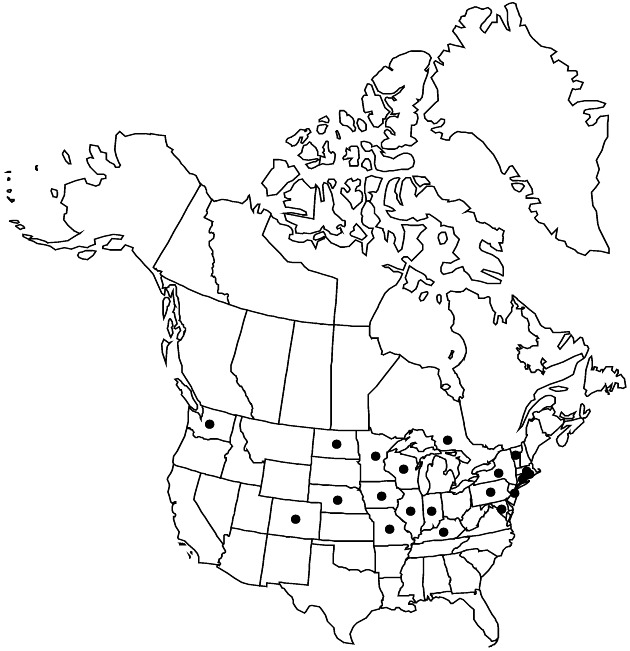Symphyotrichum ×amethystinum
Phytologia 77: 294. 1995.
Perennials, cespitose, 30–120 cm; with thick, woody, short-branched caudices at ends of fleshy rhizomes. Stems 1–5+, erect (light brown to grayish brown), densely hispidulo-hirsute. Leaves light green, thin to firm; basal withering by flowering, sessile, blades oblanceolate, 10–40 × 3–10 mm, attenuate, margins usually entire, rarely remotely serrate, piloso-ciliate, apices obtuse, rounded to mucronulate, faces sparsely to moderately strigose; proximal cauline sometimes persistent by flowering, sessile, blades linear or oblong to elliptic-oblanceolate, 40–60 × 3–10 mm, bases rounded or slightly clasping, margins entire, scabrous, apices acute to obtuse, faces ± copiously hirsute; distal sessile, blades oblanceolate, 15–45 × 2–3(–4.5) mm, progressively reduced distally, bases cuneate, margins entire, apices acute, white-spine-tipped, faces sparsely strigose. Heads in ample, leafy, paniculiform arrays, branches ascending, sometimes secund (heads often crowded). Peduncles hispid, bracts 1–3+, oblong-lanceolate, 3–5 mm, not grading into phyllaries. Involucres campanulate to hemispheric, 4–6 mm. Phyllaries in 3–5 series, linear-lanceolate, ± unequal to subequal, bases ± indurate, margins hyaline proximally, outer distally hispido-scabrous, green zones diamond-shaped, restricted to distal 1/2–1/4, apices (outer) spreading to reflexed, acute, subspinulose, (inner) acuminate, purplish, faces (outer) scabroso-puberulent or strigose, eglandular, inner distally stipitate-glandular. Ray florets 20–35; corollas azure blue to violet or lavender, laminae 5–10 × 0.6–1.2 mm. Disc florets 20–30+; corollas light yellow turning pinkish to purple, 3–4 mm, tubes ca. 1/2 narrowly funnelform throats, lobes triangular, 0.5–0.7 mm, glabrous. Cypselae dull purple or brown, obovoid, not compressed, 1.5–2 mm, 7–9-nerved, faces densely sericeous; pappi tan to tawny, sometimes rose to violet-tinged, 3.5–5.5 mm. 2n = 10.
Phenology: Flowering Aug–Oct.
Habitat: Fields, prairies, disturbed grounds
Elevation: 200–400 m
Distribution

Ont., Colo., Conn., Ill., Ind., Iowa, Ky., Md., Mass., Minn., Mo., Nebr., N.J., N.Y., N.Dak., Pa., R.I., Vt., Wash., Wis.
Discussion
Symphyotrichum ×amethystinum is the F1 hybrid between S. ericoides and S. novae-angliae, encountered sometimes throughout the area where the two parental species co-occur. It is morphologically intermediate; it has non-spiny, sparsely stipitate-glandular phyllaries and rose-violet rays in mid-sized heads. Forma leucerythros Bemis and forma leucos Bemis have been described within this hybrid and may represent recombinants or normal population color variants.
Selected References
None.